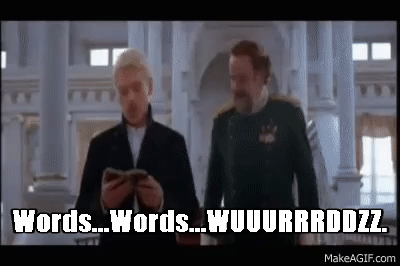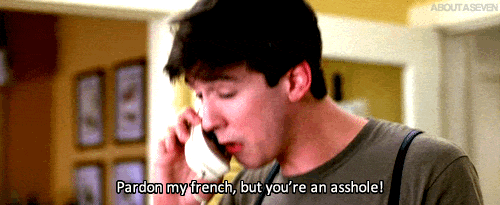Warning: language.

I find swearing to be a interesting taboo, one I engage in without any real sense of guilt. In my religious community, I’ve heard the virtues of having “clean language” and how Mormons “don’t use that kind of language.”[ref]Apparently, they’ve never heard of J. Golden Kimball. Or perhaps read much of Brigham Young.[/ref] I’ve also heard variations of “if you cuss, you must not be intelligent enough to express yourself in another way.” Ironically, this is often thrown out by individuals possessing an unimpressive vocabulary and poor communication skills (jokes on them, according to recent research).
But why do we find swearing offensive? It’s obviously not something innate in the words themselves. It’s absurd to argue for a literal evil inherent in the arbitrary sounds that a certain group of people attach meaning to,[ref]I’m sure there is a linguist somewhere cringing at the amateurish nature of this description.[/ref] especially when those sounds are meaningless to those unaccustomed to them (Japanese, Russian, or French swear words mean nothing to me since I don’t speak any of the those languages). According to philosopher Rebecca Roache, swear words
have a special role in expressing and communicating emotion. The expressions ‘My car has been stolen’ and ‘For f**k’s sake, my f**king car’s been stolen!’ both assert the same thing, but the second also conveys a sense of anger, desperation, and annoyance, thanks to the inclusion of swearing. As the linguist Geoffrey Nunberg has remarked, ‘[s]wear words don’t describe your feelings; they manifest them’. It is this unique role in expressing emotion that separates swearing from other uses of language, including other types of taboo language.
This rings true to me. Before authoring The No Asshole Rule, Stanford’s Robert Sutton published an article in the Harvard Business Review on the subject. He recollects, “I argued that censored and watered-down variations like “the no jerk rule” or “the no bully rule” simply didn’t have the same ring of authenticity or emotional appeal, and I would be interested in writing an essay only if they actually printed the phrase “the no asshole rule.” …HBR not only published the rule…but the word asshole was printed a total of eight times in this short essay!”[ref]The No Asshole Rule, pg. 3.[/ref] Jerk or bully don’t carry the same intensity as asshole. They don’t convey the same amount of disgust, frustration, anger, or even hurt. It’s fairly easy to brush off, “You’re a jerk!” It stings a little more when you’re called an asshole.

In order to understand outbursts of expletives, “we need to consider not what the speaker is referring to or talking about, but what he aims to indicate about his emotions. This makes swearing, in such circumstances, more like a scream than an utterance: just like a scream, it expresses emotion without being about anything.” After further analysis, Roache gets to the crux of the problem:
[O]nce we have established preferences about behaviour, the capacity for certain behaviour to become offensive arises quite naturally…Suppose that you make a new friend named Rebecca, and you fall into the habit of addressing her as Rachel. After you have done this a couple of times, Rebecca politely points out that her name is Rebecca, not Rachel. If, after she has drawn your attention to this, you persist in calling her Rachel, she is likely to begin to feel annoyed, and she might repeat the request to call her Rebecca. If you ignore her request a second or third time, then – provided that she has no reason to believe you have failed to understand her requests, nor that you are incapable of easily complying with them – she is likely to eventually view your behaviour as offensive. What started out as merely a dispreferred (by Rebecca) way of speaking, then, becomes offensive.
…When you continue to call her Rachel even after she has reminded you of her name, she concludes that you are being unreasonably inconsiderate of her wishes. And when you persist in calling her Rachel even after she has pointed out several times that this is not her name, it is difficult for her to avoid the conclusion that you are deliberately using an inappropriate form of address in order to upset her.
..In this example, we do not find an explanation for the offensiveness of the dispreferred expression in the expression itself. There is nothing whatsoever that is offensive about the name Rachel. Rather, the expression grows to be offensive after it has filtered through a chain of inferences that speaker and audience make about each other and about each other’s inferences. In essence: you know that Rebecca’s name is not Rachel, and you know that she dislikes being called Rachel, yet you nevertheless continue to call her Rachel; Rebecca knows that you know all this, and concludes from your behaviour in light of this knowledge that you are hostile towards her; you, in turn, recognise all this yet persist in calling her Rachel; Rebecca sees that you do this and so takes offence. Let’s call this way in which the offensiveness of dispreferred behaviour arises from these sorts of inferences between speaker and audience offence escalation.
She concludes,
What does this tell us about whether or not swearing is morally wrong? It is helpful, once again, to compare swearing to etiquette breaches. Since it’s preferable not to upset people where we can easily avoid doing so, we have some reason not to swear in contexts where it is likely to offend. The same holds for etiquette breaches. Even so, in most cases, we tend not to view breaches of etiquette as immoral, even where it causes offence. You would find my refusal to thank you for your good turn rude, but you would probably not deem it morally suspect. You would make a similar judgment were I to swear in the course of a polite conversation.
The whole thing is worth reading, though perhaps not for those easily offended by foul language.
I hear quite a bit of swearing in my job in corporate America… I most associate it with an inability to control one’s emotions, usually, their temper. While the words are offensive like an etiquette breach, an added dimension, at least for me, is that I feel embarrassed for that person and the immaturity they are putting on display.
“I feel embarrassed for that person and the immaturity they are putting on display.”
Eh. I think it depends. Flying off the handle with a barrage of expletives isn’t bad or immature suddenly *because* of the expletives (at most they may slightly add to it due to the etiquette breach). It would be just as insane if they used relatively clean language, gibberish, or grunts and shrieks. It’s bad and immature because they are *flying off the handle.* It’s because they are quite literally not controlling their temper. The bad language isn’t what is making the display immature.
I find little maturity difference between someone losing a file on their computer and audibly–though not loudly–saying “Shit!” and another saying “Crap!” Or “Fetch!” Or “Doggone it!” In this case, I suppose the truly controlled person would be the one who doesn’t say anything at all or merely lets out a sigh. And I’d likely chuckle at the person saying “doggone it” because of how old fashioned it sounds and because they likely think that this swear alternative means they are a good person. Same thing with “fetch.”
Swearing in public areas when you are not sure if people will be offended or not? That’s definitely a sign of immaturity. It shows that you don’t care about whether or not you offend others. But swearing around people who don’t take offense or even engage in it themselves? I find making the case against that difficult.
Now, if expletives are pretty much *all* they use? That’s also different, but not because of the expletives. This would be an actual case of someone having a limited vocabulary, which could signal a lack of intelligence, education, and maturity.
Fair Point. A person flying off the handle is immature no matter the language they use. That being said, I can’t think of anyone I have seen that truly flies off the handle and still uses G or even PG language. In my experience, losing control and swearing are frequent companions.
I have on more than one occasion used a swear alternative to diffuse confrontational situations, whereas swearing typically escalates a situation. To hear a grown up person use something like “doggone it” in a tense situation turns out to be funny to a lot of people probably because, like you mentioned, it sounds old-fashioned.